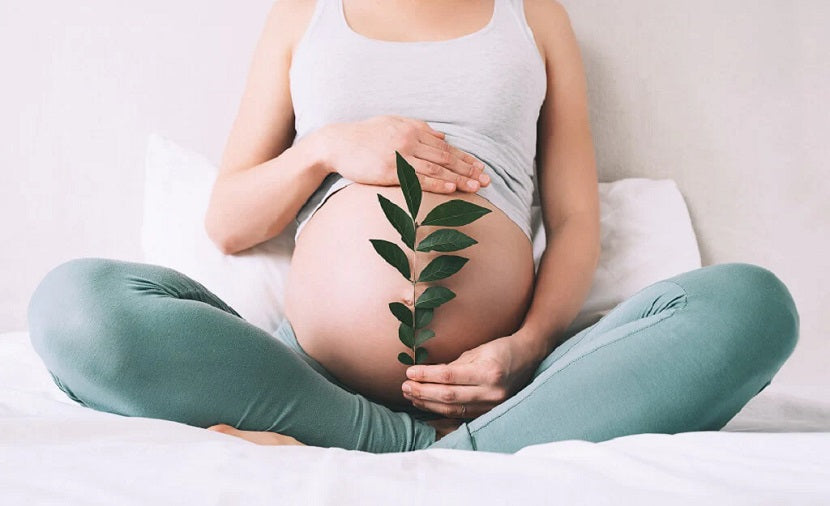In a perfect world, we would like to offer women at least 12 months to prepare the body for pregnancy. Preconception self-care gives them and their babies the best conditions for a new phase in life.
Though not always totally possible, we encourage women—and men—to allow at least 3-6 months to prepare their bodies for conception. Very often, this will optimise chances of conceiving as there will be enough time for the sperm and the follicles to go through a maturation cycle. Furthermore, the body is able to experience the positive changes that preconception self-care has brought about.
Just as we prepare the soil to be as fertile as possible before we sow the seeds, we also want to prepare our own body and mind for pregnancy.
Nurturing the body and mind creates the most ideal environment from within. Let’s look at what optimizing preconception self-care should include.
Become cycle aware
In order for conception to occur, there are a few requirements that must be met. Firstly a woman must be ovulating, which requires healthy follicles that are responding to the circulating hormones.
Once ovulation has occurred, the corpus luteum—from the follicle that housed the ovum—will produce progesterone. Progesterone is an essential hormone for pregnancy. It nurtures and supports the endometrial lining in order for implantation to occur. In a fertile cycle, the luteal phase must be between 11-16 days long, something a woman can begin to observe when she learns how to track and chart her cycle.
Secondly, the male partner must be producing healthy sperm that has the ability to meet and fertilize the ovum at the time of ovulation. In order for the sperm to be able to enter the uterus, the woman must also have a healthy cervix that responds to the circulating hormones and produces the necessary cervical mucus. Healthy cervical mucus production is essential for fertility. It gives nourishment to the sperm, filters out the unhealthy ones, and guides good sperm through the cervix, uterus and fallopian tube. Cervical mucus also has the ability to keep the sperm alive for 3-5 days as they wait for the ovum to be released.
This time before ovulation is known as the fertile window. This is a crucial period to get intimate as it is the only time in the cycle a woman can get pregnant. Learning to understand your own cycle and being able to identify your fertile window and peak of fertility are key to optimizing chances of conceiving.
Nourishment in the form of nutrition
Everything starts with healthy follicles. What we put into our bodies greatly impacts hormonal balance and the quality and health of the follicles. Specific vitamins, minerals, proteins, fats, carbohydrates, and fibre are required to manufacture, transport, utilize, break down, and eliminate hormones.
What we choose to eat and not eat—and what makes its way into our food such as pesticides and preservatives—do influence our reproductive and hormonal health, as well as our fertility.

There are a few obvious things that we want to look at such as excluding tobacco and alcohol. We must also assess what medications we are taking on a regular basis and how these may affect our fertility. Furthermore, you’ll want to limit your intake of caffeine, sugar, processed foods, and damaged fats (such as partially hydrogenated vegetable oils) as these can all influence our hormone levels and contribute to increased inflammation.
Here are some more suggestions on how you can improve reproductive and hormonal health through proper nutrition:
-
Filter your water and aim to have at least 2 litres each day. Water helps to maintain balance in the body and is also essential for supporting our detoxification and elimination pathways.
-
Choose quality proteins. Proteins are the building blocks for life that are broken down into amino acids for repair and growth of all tissues. They are also vital for egg and hormone production as well as growth of the endometrial lining. Quality protein sources can be quinoa, legumes, organic eggs and chicken, non-farmed fish, seafood and grass-fed beef.
-
Fat is another essential building block of sex hormones, especially cholesterol which we receive from animal sources. A small amount of animal products can therefore be very beneficial in optimizing fertility as a part of a preconception plan. Essential fatty acids such as Omega 3 are anti-inflammatory and essential for fetus development. These are best consumed in their whole form such as in nuts and seeds, extra virgin olive oil, flaxseed oil, avocado, and fatty fish.
- Carbohydrates are also an essential part of a preconception diet. This is where your vegetables, whole grains, and fruit will fit in. Processing of carbohydrates (grains in particular) removes a large amount of the vitamin and mineral content and leaves us with a higher amount of starch. Therefore, we encourage you to consume grains in their whole form, soaked and sprouted to aid digestion and assimilation.
As a baseline, our latest HAPPY HEALTHY YOU book will provide you with a guide on how to optimize your diet by including more variety of plant foods and phytochemicals to support detoxification and gut health.
Mental wellbeing and stress management
Stress is one of the most common hormonal and fertility disruptors. Start thinking about how you can free up more time for self-care by slowing down and prioritizing your physical and mental health and wellbeing.
Consider where you are falling short in your life and which areas could benefit from extra nourishment and attention. Perhaps some things have to go in order to create space for the new to enter. It can be very useful to shift your focus from getting pregnant to optimizing health and let that be your guide for the choices you make on a daily basis.
- Prioritize your downtime and dare to say no to events, family dinners, parties etc. when your energy levels are running short.
- Listen to what your body needs at certain times in your cycle.
- Incorporate practices that help you connect with your body such as mindful movement, meditation, and self-massage.
- Use journaling as a way to process thoughts and emotions that may arise throughout this phase and to promote deeper sleep.
- Make sure sleep is one of the top priorities. If your sleep is disrupted, look at ways to nurture your nervous system and balance your circadian rhythm. Spending time in nature, getting enough daylight exposure, daily exercise and avoiding screens and bright lights at night are simple interventions to begin with.
Daily meditation can help clear your thoughts and make you feel more connected to your body and what circles through your mind. Once you start a regular meditation practice, it will help you manage stress in a more efficient way. Try this heart and womb meditation below!
Exercise in moderation
Find your sweet spot when it comes to exercise. Movement helps to stimulate circulation, release stress and support a healthy menstrual cycle. Too much can easily become a stressor for the body. Look for activities that promote circulation, yet do not deplete your body of energy. Yoga and mindfulness can really support hormonal and reproductive health and provide support on your fertility journey.
Fill the gaps with herbs and supplemental nutraceuticals
Although a whole-foods diet should provide the body with all the nutrients, minerals and vitamins it needs, we cannot deny that this is not always the case. Depending on sourcing and farming techniques, the food we consume may not cover the requirements enough to provide a thriving body. In these cases, a whole foods, high-quality prenatal supplement can be recommended to fill the gap.
Herbal medicines can assist with optimizing this preconception period by supporting detoxification, gut microbiota and hormonal balance. It can be beneficial to introduce green superfoods and herbs to aid liver detoxification such as milk thistle, broccoli sprouts, turmeric, alfalfa and wheat grasses. Happy Greens and Happy Turmeric are fermented extracts that will support healthy hormonal functioning and provide the gut with beneficial bacteria as well as alkalise the blood and reduce inflammation.
In women with irregular cycles, short luteal phase or inadequate oestrogen production, Happy Hormones can be a wonderful tool to support regularity, ovulatory function and healthy follicles. Happy Hormones contain key herbal medicines such as Chaste Tree, Black Cohosh, Wild Yam, Gymnema, Maca and Dandelion to support the female reproductive system.
It takes two to tango
As mentioned above, the health of the sperm is just as important as the health of the follicles. In couples who struggle with infertility, the male contributes to infertility in about half of all cases.
The quality of the semen can be used as a biomarker of male health. Semen is highly dependent on dietary, lifestyle and environmental factors such as oxidative stress and DNA damage. Inadequate nutrition, poor sleep, obesity, smoking, alcohol and caffeine intake as well as environmental chemicals can all influence the quality of the semen.
A whole foods diet that is high in vegetables, quality proteins, healthy fats like olive oil and coconut oil, nuts, seeds, legumes and whole grains, with less processed foods, meat and refined sugar, is recommended to improve semen quality. Limit intake of caffeine to one cup of coffee per day and minimize alcohol consumption as well.
Just as for women, stress is a problem amongst male fertility. Consider both inactivity and excessive exercise being possible factors of decreased fertility. Let your partner also indulge in the self-care practices you do! For example, build connection, intimacy and support relaxation with a simple Epsom salt bath!
Summary
The journey towards conception can be physically and mentally challenging. If you can allow for 6-12 months to prepare your body pregnancy, both you and the baby will benefit. Nourishment is absolutely essential and staying attuned to your inner cycles will help you build a stronger connection to your body. While our online programs and resources are wonderful guides, having the support of an experienced practitioner can really help you optimise your self-care and current life situation for the best chances of conceiving. Reach out to our team today and let us support you on your fertility journey!

REFERENCES
Lynch CD., Sundaram R., Maisog JM., Sweeney AM, & Buck Louis GM. (2014). Preconception stress increases the risk of infertility: results from a couple-based prospective cohort study--the LIFE study. Human reproduction (Oxford, England), 29(5), 1067–1075.
Oostingh EC, Steegers-Theunissen RP, de Vries JH, Laven JS, & Koster MP. (2017). Strong adherence to a healthy dietary pattern is associated with better semen quality, especially in men with poor semen quality. Fertility and sterility, 107(4), 916–923.e2.
Skoracka K., Ratajczak AE., Rychter AM., Dobrowolska A, & Krela-Kaźmierczak I. (2021). Female Fertility and the Nutritional Approach: The Most Essential Aspects. Advances in nutrition (Bethesda, Md.), 12(6), 2372–2386.










Leave a comment
This site is protected by hCaptcha and the hCaptcha Privacy Policy and Terms of Service apply.